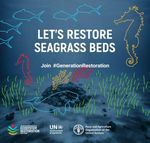2021 2030 DECADE ON ECOSYSTEM RESTORATION PROMOTED BY THE UNITED NATIONS - 2030 decade on ecosystem restoration promoted by ...
←
→
Page content transcription
If your browser does not render page correctly, please read the page content below
2021 - 2030 DECADE ON ECOSYSTEM RESTORATION
PROMOTED BY THE UNITED NATIONS
The United Nations Decade on Ecosystem
Restoration 2021-2030 has been officially
launched during the World Environment Day,
celebrated in all countries the 5th of June 2021.
The Decade on Ecosystem Restoration unites
the world behind this common goal: preventing,
halting and reversing the degradation of
ecosystems worldwide for the benefit of people
and nature. Healthier ecosystems, with richer
biodiversity, provide greater benefits such as
more fertile soils, bigger yields of timber and
fish, and larger stores of greenhouse gases.
They can help to end poverty, combat climate
change and prevent a mass extinction.
The UN Decade on Ecosystem Restoration has been promoted by more
than 70 countries and proclaimed in March 2019 by the United Nations
General Assembly (UNGA) with the aim of supporting and scaling up
efforts to prevent, halt and reverse the degradation of ecosystems on every
continent and in every ocean. UN Member States decided to implement a
Decade to ensure that healthy ecosystems play a critical role towards
achieving the SDGs by 2030. The 2030 Agenda for Sustainable
Development seeks to end poverty, conserve biodiversity, combat climate
change and improve livelihoods for everyone, everywhere. However, the
international community has assessed that the 17 Sustainable
Development Goals (SDGs) are unlikely to be met unless ecosystem
degradation is stopped and ecosystem restoration is undertaken on a
global scale.
The UN Environment Programme (UNEP) and the Food and Agriculture
Organization (FAO) have been tasked to lead the implementation of the
Decade. During the preparation phase, in 2019 and 2020, UNEP and FAO
involved a wide and significant range of collaboration agencies, funding
and supporting partners. The strategy of the Decade is the result of a
global and open consultation process drawing more than 2,000
contributions from governments, organizations and others actors around
the world. The strategy focuses on three pathways: building a global
restoration movement; increasing political will and building the required
technical and financial capacity for restoration at scale.
The Decade focus on different categories of ecosystem that need some
level of protection and restoration to achieve global goals, because of the
varied causes of degradation: farmlands, forests, freshwaters, grasslands,
shrublands and savannahs, mountains, peatlands and urban areas. All
these ecosystems are described in their main components, current status
and major threats, as well as the benefits of restoring them in the Decade
webpage.
Ecosystem restoration encompasses a wide continuum of activities that
contribute to protecting intact ecosystems and repairing degraded
ecosystems. Such activities include, for example, enhancing organic
carbon in agricultural soils, increasing fish stocks in overfished zones,
remediating polluted sites, restoring ecological processes, restoringbiodiversity and conserving fauna and flora that can assist in the restoration process. The scale of these activities can range depending on the societal actors and ecosystems involved. The UN Decade highlights that restoring damaged ecosystems is an efficient and cost-effective way people have to work with nature to address the most pressing challenges humanity is facing today. Restoring ecosystems increases the supply and quality of ecosystem services towards desired outcomes, supporting national sustainable development priorities. The economic benefits exceed nine times the cost of investment, whereas inaction is at least three times more costly than ecosystem restoration. Between now and 2030, the restoration of 350 million hectares of degraded terrestrial and aquatic ecosystems could generate US$9 trillion in ecosystem services. Restoration could also remove 13 to 26 gigatons of greenhouse gases from the atmosphere. The UNGA Resolution and the strategy highlight that this huge challenge can only be met if everyone come together to find viable and lasting solutions. The UN Decade will inspire and globally support governments, UN agencies, NGOs, civil society, private sector companies, indigenous peoples, farmers, women’s groups, local communities and individuals to collaborate and develop the appropriate skillsets for catalyzing and successfully implementing restoration initiatives across the world. During the preparation phase important results have already been achieved in involving many actors from all over the world and the official UN Decade website presents the first 50 initiatives that from the various countries and continents have already joined the strategy and established an organic partnership. The information page of these initiatives and the website of the sponsoring organizations allow to know their objectives and all the actors mobilized in the territories to restore their areas and to ensure the protection of natural heritage while promoting a sustainable local development. The official website invites all restoration implementers to join the movement presenting their initiative to the Decade Hub and following the application process. Although the UN Decade ends in 2030, it aims to create a platform for societies to put their relationships with nature on a new trajectory for the centuries to come. It is envisaged that this trajectory will include: nature being respected across society; ecosystem restoration taking place over hundreds of millions of hectares and generating millions of new livelihoods; human rights, with a focus on gender equity, youth, local communities, indigenous peoples and future generations being central to restoration initiatives; global supply chains and consumption patterns being shifted to protect, sustainably manage and restore nature; long-term scientific research being used to guide restoration initiatives; and the value of nature being a central pillar of national systems that assess economic well-being. The UN Decade offers a new important reference framework for the actors who promote integrated and sustainable territorial development processes and already carry out actions for protecting natural resources and repairing degraded ecosystems for the benefit of people and nature. Their participation could consist in establishing collaborations with the initiatives already designed, which involve specific countries and types of ecosystems, as well as in designing new initiatives in collaboration with new organizations. The website presents extensive information on initiatives underway, news, opportunities, and indicates how to participate. To know more UN Decade on Ecosystem Restoration 2021-2030 website UNGA Resolution 2019
Types of ecosystem restoration UN Decade on Ecosystem Restoration Strategy The first 50 initiatives To register new initiatives About ecosystems in UN Environment website UN Decade on Ecosystem Restoration in FAO website Ecosystem services and biodiversity in FAO website Article in UN Environment website UNEP-FAO Fact sheet UN Decade in UNEP Facebook Article State of financing for Nature in UNEP website State of Finance for Nature Report in UNEP website
You can also read



























































